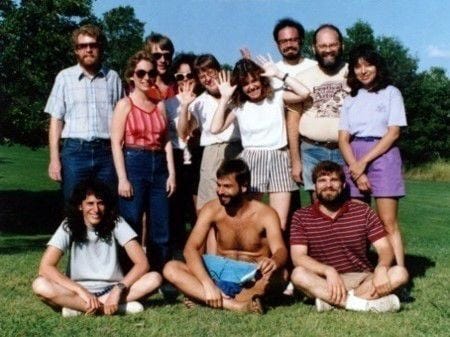What did a dairy farmer's daughter & a computer science prodigy have in common? They both turned pennies into billion-dollar empires from the same unlikely state.
When you think of America's business titans, you probably picture Silicon Valley's tech barons or Wall Street. Most don't think of Wisconsin. But maybe you should.
Hidden in America's heartland, Wisconsin has quietly produced two of the most successful self-made female entrepreneurs in history: Diane Hendricks of ABC Supply and Judy Faulkner of Epic Systems. Together, they represent dozens of billions in wealth built from scratch in industries that couldn't be more different—yet their stories reveal something profound about what makes entrepreneurs thrive.
The Dairy Farm to Billions: Diane Hendricks
Diane Hendricks' story begins not with business school or venture capital, but with watching her husband Ken's father get disrespected by suppliers. Ken Hendricks spent his formative years working construction with his contractor father, witnessing firsthand how suppliers treated contractors like second-class citizens—late deliveries, poor service, and a general attitude that contractors should be grateful for whatever they got. Most supply stores were only open 9-5, forcing contractors to compromise on their billable hours and productivity just to wait in line.
That humiliation became the foundation of a $20.9 billion empire.
By 1982, Ken was already running two successful companies—International Roofing and Hendricks Real Estate Properties. But when the economic slowdown hit that year, instead of playing it safe, Ken and Diane made a counterintuitive move: they borrowed heavily to acquire three failing supply centers from Bird & Sons Inc. These became the first locations of American Builders and Contractors Supply.
Here's what made them different from day one: they decided to treat contractors like the professionals they were. While competitors made contractors wait in line behind walk-in customers, ABC Supply created contractor-only lanes. While others closed at 5 PM, ABC stayed open late. While competitors acted like they were doing contractors a favor, the Hendricks built their entire business model around the radical idea that contractors deserved respect.
The growth was methodical but relentless. They reinvested every dollar back into acquisitions, often buying out competitors who couldn't match their service levels. When Ken died tragically in 2007, Diane faced a choice: cash out or double down. She chose to buy out all the private equity partners for $1.4 billion, becoming sole owner of what was already America's largest roofing supplier.
The Basement Startup: Judith Faulkner
I probably write about Judy and what working for her taught me too much for my own good. But here we go again. Here’s her full, unabridged path to a $50 billion company began with pure stubbornness—and a refusal to start a company.
Originally a pure math person, Faulkner was working as a programmer at the University of Wisconsin Medical Center in the 1970s when she built a database called Chronicles to help doctors manage patient records. It was supposed to be a one-off project, just for Wisconsin.
But then something unexpected happened: the doctors at UW started bragging about Chronicles at academic conferences. Word spread virally through the medical community. Other health systems began calling Wisconsin, then calling Judy directly, begging her to build the same system for them. Faulkner kept saying no. She wasn't interested in starting a company—she was a programmer, not an entrepreneur. She just wanted to solve problems for the doctors she worked with.
The requests kept coming. Again and again, health systems would call, offering money for her to replicate Chronicles. Finally, after what felt like the hundredth request, she broke down: "Fine. I'll start a company. But it'll be part-time, just me and a couple other people working part-time. This will be a small little thing."
In 1979, she founded Human Services Computing (later renamed Epic Systems) in a basement with $70,000—money she'd saved from her university salary. The plan was to stay small, maybe serve a few local health systems. They started in a small building at 2020 University Ave, sharing the space with another quiet juggernaut, American Girl Doll, which as you can probably guess was founded by yet another brilliant female entrepreneur, Pleasant Rowland.
Instead, she accidentally built the software that now holds medical records for over 325 million Americans. Epic's revenue hit $4.9 billion in 2022, with an internal valuation north of $35 billion or, with standard comps and multiples, perhaps more like $60 billion. Faulkner still owns the majority of the company, having turned down countless acquisition offers from tech giants, competitors, and private equity firms.
The Wisconsin Factor: What's in the Cheese Curds?
So what is it about Wisconsin that produced these two generational entrepreneurs? It's not just "Midwest values"… plenty of states have those. Wisconsin has a unique combination of factors that sets it apart from other Midwest states:
🦡 The University of Wisconsin System as an Innovation Engine: Wisconsin's flagship university isn't just academically excellent—it's deeply integrated with industry. UW-Madison ranks #18 in "Best Undergraduate Business Programs" and has a top-20 CS program. Go Badgers! More importantly, it has a 150-year history of practical innovation. Their food sciences department even sells its own cheese curds and ice cream in Madison! The university pioneered the "Wisconsin Idea": the concept that research ought to directly benefit the people of the state.
In particular, Faulkner earned her master's there and was exposed to Professor Warner Slack's (RIP) pioneering work in medical computing, perhaps the first course of its kind in the nation. The university's culture of solving real problems with technology—not just publishing papers—clearly influenced her approach to healthcare software.
Tax Structure That Rewards Long-term Building: Wisconsin isn't a low-tax state, but it has something more valuable: predictable, stable tax policy. Wisconsin has a graduated state individual income tax, with rates ranging from 3.50 percent to 7.65 percent, and a 7.9 percent corporate income tax rate.
Compare this to states like Illinois, which has faced repeated mismanagement of state assets and fiscal volatility, or Kansas, which went through massive tax experimentation. Wisconsin's taxes are higher, but they're stable and predictable: crucial for businesses planning 20-40 year growth trajectories.
Manufacturing Heritage Meets Knowledge Economy: Wisconsin is known for its industrialized history and mechanical manufacturing economy, with companies like Rockwell Automation now innovating smart machines. This industrial base provided both entrepreneurs with practical advantages. Hendricks understood supply chains and manufacturing because Wisconsin had deep expertise in both. Faulkner could build complex software systems because the state had engineers who understood how to build complex things that actually worked.
Patient Capital Culture: Unlike coastal venture capital that demands rapid exits, Wisconsin's business culture rewards patient building. Both entrepreneurs bootstrapped their companies without outside pressure to sell or go public. This allowed them to focus on building sustainable businesses rather than optimizing for quick returns. This pattern explains why Wisconsin punches above its weight in producing not just billionaires, but sustainable, multi-generational businesses. The state's entrepreneurs aren't trying to disrupt industries—they're trying to serve and perfect them.
Regional Reciprocity Agreements: Wisconsin has reciprocity agreements with Illinois, Indiana, Kentucky, and Michigan, making it easier to do business across state lines. This gave both ABC Supply and Epic Systems natural expansion paths into neighboring markets without complex tax complications.
Building Boring Stuff that Works
Hendricks and Faulkner aren't outliers—they're part of a broader Wisconsin pattern of building category-defining companies in "sleepy" industries that coastal investors ignore until it's too late. Consider the state's roster of generational businesses: Oshkosh Corporation (vehicles & defense), Kohl's (retail), Harley-Davidson (motorcycles), Fiserv (financial services), and Northwestern Mutual (insurance).
Wisconsin’s entrepreneurs have a knack of picking unglamorous industries with real problems, build powerful networks of relationships, and quietly dominate their categories while private equity and venture capital chase shinier objects. Not bad for the drunkest state in the union! By the time big money notices, these companies have become unmistakable category leaders with deep competitive moats.
And remarkably, Wisconsin's business culture seems to flatten traditional gender hierarchies in ways that other states don't, creating space for women like Hendricks and Faulkner to build without the additional friction they might face elsewhere. While coastal investor culture remains dominated by ego-driven, short-term, testosterone-fueled decision-making, Wisconsin's patient capital approach rewards methodical builders regardless of gender.
Giving Back, as Always
These aren't just individual success stories—they're economic engines. ABC Supply employs thousands across the country. Epic Systems has over 9,600 employees, most in Wisconsin, making it one of the state's largest private employers.
Both women have also committed to giving back. Roots & Wings is a family foundation launched in 2020 by Judy and Gordon Faulkner. Hendricks’ family foundation invests heavily in revitalizing her hometown of Beloit, Wisconsin. But their companies have been in the business of giving back from day-one.
Lessons for Budding Entrepreneurs
The Hendricks-Faulkner axis offers critical lessons for aspiring entrepreneurs:
Be Boring: Success comes from solving real problems, whether it's getting roofing supplies to contractors or helping doctors access patient records.
Geography Isn't Destiny, Unless You Let It: You don't need to be in Silicon Valley or New York to build a world-class business. Sometimes being outside the echo chamber is an advantage.
Trust Your Own Pacing: Both women built over decades, not years. They chose sustainable growth over rapid scaling.
Board Control Matters: Long-term thinking was possible only because they maintain significant ownership in their companies, allowing them to build according to their vision rather than external pressures.
As coastal cities become increasingly expensive and competitive, perhaps it's time to look to America's heartland for the next generation of business leaders. If Wisconsin can produce Hendricks and Faulkner, imagine what other overlooked regions might be quietly incubating the next wave of transformative entrepreneurs.
The question isn't whether Wisconsin will produce more billionaire entrepreneurs—it's whether the rest of the country will learn from how they do it.
What do you think explains Wisconsin's entrepreneurial success across genders? Are there lessons here for other regions trying to build their own business ecosystems? Share your thoughts in the comments below.









chronicles is like a filing cabinet